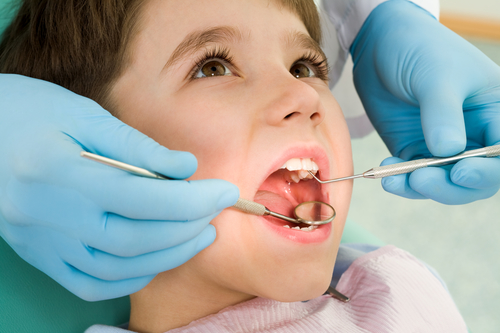Many children are often apprehensive at the dental office. But it’s always helpful to bring your little one to the dentist when they are very young. This makes their first experience a fun and non-threatening one. The most common form of behavioral management is effective communication.
Establishing an initial bond with a child and earning their trust is crucial in a doctor-patient relationship. And once a child trusts a dentist, the dental procedure usually goes very smoothly. For patients who come in for a procedure and are very fearful, sedation can help make the child comfortable.
The mildest form of sedation involves the use of nitrous oxide or laughing gas. It’s an easy and simple way to help your child feel comfortable and calm during dental treatment. Your child will remain awake and responsive throughout the entire procedure. It’s a successful method for children who are mild to moderately anxious.
For children who are more fearful, oral sedation is a good option. During oral sedation, a combination of oral medication is administered to help your child relax without putting him or her to sleep. The types of oral sedative and dosages are tailored to your child’s specific needs.
How Parents Can Help
Do’s

Close-up of little boy opening his mouth wide during inspection of oral cavity.
Before your child steps into the dentist’s office, make sure you let them know about the visit. You may want to show them a few videos first about tooth health first. These videos are available in animated versions. So wit down with your child and watch them together. They’re very easy to understand and kids would feel like they’re watching a cartoon! Pose simple questions like “Why should we keep our teeth clean?” or “Why do baby teeth fall out?”
Choosing a kids-friendly office is very beneficial for both the dentist and the child. Dentists who love being around kids will make them feel at ease. They often initiate easy-going interactions and give them the liberty to move around the office and explore the different tools used.
Kids with dental anxiety feel most comfortable and at ease with either parent being by their side. So when your child is requested to enter the dental treatment room, try to be by their side. They’ll feel so safe and contended knowing you’re around.
Don’ts
Rewarding and bribing doesn’t seem ideal if you’re driving your child to the dental office. Your child should be rewarded for a desired behavior. And getting them to visit a dentist shouldn’t be on the pretext of a treat. Your child should actually feel like visiting the dentist because they want to and for their own good, not because you’re dragging them there. In such situations, children will feel like they’ll always be given a reward for every new place they visit.
Kids with dental anxiety are already fearful of new situations and meeting new people. And your aim as a parent should be eliminating any possible fear in them. So avoid using harsh words in front of them. Don’t punish them or scold them either. All they want from you is a lot of love and patience.
In addition to the above suggestions, make sure you never give up on your child. They’re more likely to understand the importance of oral hygiene and healthy teeth when you support them through their anxieties. On some days they may feel very confident, and on other days they may completely give up. And you need to make sure you’re supporting them every time they want your attention.
How can doctors help?
Do’s
Dental anxiety in children may seem challenging. And dentists should make sure they remain patient. When entering a dentist’s office for the first time, children may feel out of place. And as a dentist, you should make a child feel comfortable first.
Use simple and kids-friendly words. For example, ‘tooth vitamins’ instead of fluoride and ‘raincoat’ instead of rubber dam are words that children are familiar with. So, they’re likely to pay more attention to what you have to say.
Don’ts
Treat your little patient just like you would treat your own child. Ask yourself if you use frightening words like ‘blood’ or ‘hurt’ with your own children. Well, you certainly would not.
Don’t tell their parents to leave the treatment room in front of them. It’s just going to make them panic and worry. The dental anxiety will just escalate and they’ll probably refuse to let the treatment begin.
If these tips still don’t help your child overcome dental anxiety, you may want to consult a specialist who can guide your child through their battles. Seeking professional help can make dental visits easier for your child.
 Biographical Info
Biographical Info
Dr. Anu Isaac, DMD, runs a successful dental practice in Salem, MA. As the founder of Coral Dental Care, she is dedicated to creating healthy, beautiful smiles for her patients and also to educating dental and non-dental community with her engaging articles on all things related to oral health, recent dental innovations, and latest treatment modalities.









Leave a Reply